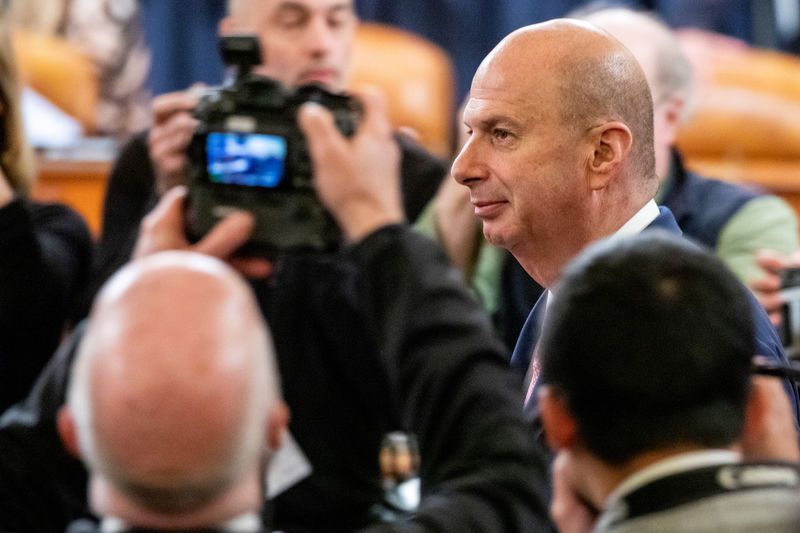(Reuters) - Senior U.S. diplomats and national security experts have testified before Congress about behind-the-scenes maneuvering by President Donald Trump or aides to pressure Ukraine to investigate his political rivals.
With Democrats in the U.S. House of Representatives moving toward possibly impeaching Trump, who urged Ukraine's president in a July 25 phone call to carry out the investigations, here are highlights of testimony already given by key witnesses in televised hearings:
THE QUID PRO QUO
Since the House began a formal impeachment inquiry on Sept. 24, Democrats and Republicans have argued over whether Trump demanded a political favor from Ukraine to benefit him personally in return for the release of $391 million in U.S. security assistance to Kiev.
In testimony on Nov. 13, William Taylor, acting ambassador to Ukraine, said it was his understanding that the delivery of the U.S. aid to Ukraine was linked to Ukraine President Volodymyr Zelenskiy announcing investigations of former Vice President Joe Biden and his son, Hunter, who had business dealings in Ukraine. The elder Biden is a leading Democratic candidate for president in 2020.
Democrats contend that any linking of aid to the probes Trump sought would fit the definition of the Latin term "quid pro quo," or a favor for a favor.
Under questioning from Republicans, Taylor acknowledged that he did not have firsthand knowledge of Trump explicitly tying the aid to investigating the Bidens.
But Gordon Sondland, a Trump donor and ambassador to the European Union, told Congress: "Was there a quid pro quo? As I testified previously, with regard to the requested White House call and White House meeting, the answer is yes."
Sondland was referring to Zelenskiy's drive to get a White House meeting with Trump.
NATIONAL SECURITY CONCERNS
National security officials working in the White House told of their worries over Trump's phone call with Zelenskiy and the role that Trump's private lawyer Rudy Giuliani was playing in shaping policy toward Ukraine, an important U.S. ally.
Army Lieutenant Colonel Alex Vindman, a top Ukraine expert assigned to the White House, was one of several people who listened to that call. Vindman testified that Trump had made an "improper" demand of Zelenskiy, referring to the American president urging Zelenskiy to initiate investigations.
"Frankly, I couldn't believe what I was hearing. It was probably an element of shock that maybe, in certain regards, my worst fear of how our Ukrainian policy could play out was playing out," Vindman said.
Trump has repeatedly defended what he calls a "perfect" phone conversation, saying his goal was to ensure that any U.S. aid delivered to Ukraine was not falling into corrupt hands.
GIULIANI'S ROLE
David Holmes, a career diplomat serving in the U.S. Embassy in Ukraine, testified that his work started to become overshadowed in March by Giuliani, who was pushing Ukraine to carry out probes of the Bidens and a debunked conservative theory that Ukraine meddled in the 2016 U.S. elections.
Former White House Russia expert Fiona Hill recalled how then-national security adviser John Bolton called Giuliani, a private citizen with no formal job in the administration, "a hand grenade who's going to blow everybody up."
Trump has defended the former New York City mayor and ex-federal prosecutor, saying his crime-fighting abilities were needed to deal with corruption in Ukraine. Giuliani has said that everything he did was to protect his client: Trump.
PENCE AND POMPEO
Sondland told the House Intelligence Committee that several senior administration officials, including Vice President Mike Pence and Secretary of State Mike Pompeo, knew about efforts to pressure Ukraine to carry out investigations that might help Trump.
"Everyone was in the loop" about the efforts to get Ukraine to conduct investigations that Trump sought, Sondland testified.
A top Pence aide said in a statement that the vice president "never had a conversation" with Sondland about investigating the Bidens or the conditional release of aid to Ukraine.

A State Department spokeswoman said Sondland never told Pompeo that he believed Trump was linking the aid to the requested investigations and "any suggestion to the contrary is flat out false."